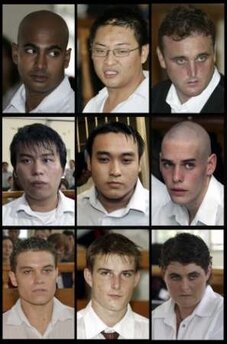|
The AFP believes that its side of the story hasn't been told, but its responses raise more questions than answers. Paul Toohey reports
 The AFP is hyper-sensitive to criticism over its actions. It is quietly put to reporters – this one, anyway – that the reason they’re so ignorant in their reporting is because they haven’t been properly “engaged” from the start, which is code for being persuaded onside. You may not want to be persuaded. So you write formal email questions: The AFP is hyper-sensitive to criticism over its actions. It is quietly put to reporters – this one, anyway – that the reason they’re so ignorant in their reporting is because they haven’t been properly “engaged” from the start, which is code for being persuaded onside. You may not want to be persuaded. So you write formal email questions:
Q: You have said the notion that the AFP potentially sacrificed the nine Australians, or some of them, to their deaths, or traded them off in order to shore up trust and goodwill with Indonesia for other policing initiatives (ie, counter--terrorism) is offensive. I would like to offer the opportunity for the AFP to say why people should not see it this way.
A: “The AFP’s objective in providing information to the Indonesians was to disrupt the activities of an organised group attempting to import heroin into Australia. While the AFP had certain information relating to the group’s activities, this did not amount to evidence. By the time the AFP had obtained a strong intelligence picture, members of the Bali Nine had begun to travel overseas. The best chance the AFP had of collecting evidence was to engage the help of the INP to conduct a surveillance operation offshore.
“There is no doubt that the AFP’s relationship with the INP is excellent, demonstrated by unprecedented levels of co- operation in recent years. This excellent relationship is a direct result of AFP’s reputation in the Asian region for honesty, transparency and integrity.”
That relationship has not come from AFP officers drinking coffee with their Indonesian counterparts. It has to do with Australia pouring buckets of money into Asia for customs, security and forensic training, to buy itself into the Asian anti-terrorism loop.
Q: Would it not have been possible for the AFP to seek Indonesia’s cooperation in letting the couriers pass through to Australia? … They (the Indonesians) could have targeted the suppliers of the heroin and Australia could have picked up the mules and the others on conspiracy, and presented it to the public as an example of two nations working together closely.
A: “It is not the AFP’s policy to place demands on overseas law enforcement agencies … Our relationships offshore are based on mutual respect and we must respect the sovereignty of other legal systems.
“In this particular case, the principal offences allegedly committed took place in their jurisdiction and it was their decision to interdict at a time when they believed they had sufficient evidence and the best opportunity to apprehend all those implicated. The AFP accepted that it would be up to the INP to make the appropriate operational decision in relation to the timing of interdiction.
“Allowing the four alleged couriers and the alleged overseer arrested at Denpasar Airport to return to Australia was unlikely to lead to the apprehension of more suspects in Australia or Indonesia.
“Action of this nature may well have prevented Indonesia from arresting other people who had been implicated through surveillance. The facts remain that the AFP has charged and put before the courts alleged members of the distribution network in Australia – as a result of collaborative efforts. As you would expect, the AFP ensured that INP was aware of ongoing operations in Australia and therefore the need for ongoing liaison so that domestic investigations were not jeopardised.
“Investigations continue overseas in relation to identifying other individuals involved in the supply of the heroin. It is always our aim to work collaboratively to apprehend as many offenders as possible, including the organisers and facilitators.”
While it is true that the principal offence occurred in Indonesia, the conspiracy case could have been made before they left Australia. They may not have got everyone, but they would have shut down the group. Chan and Sukumaran are by all accounts the group’s leaders – there is no overlord in Australia, nervously awaiting a visit from police.
Sukumaran’s name was not among those the AFP gave the INP. The AFP says it did not know of his existence when they first began surveillance on the group in February 2005. He didn’t make himself known until the group came together in Bali. The AFP argues that without the help of Indonesia, players such as Sukumaran could have been missed altogether.
Yet had the known players been arrested before they left Australia, or had the couriers been arrested on return to Australia, there is every chance they would have rolled over and told the AFP everything they needed to know about Sukumaran. The AFP is proud of its “excellent reputation” in Asia. But what about its reputation in Australia?
Bali 9 Case Information
|